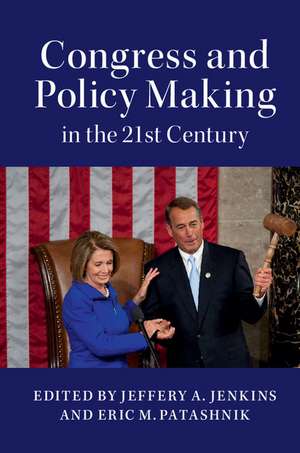Congress and Policy Making in the 21st Century
Editat de Jeffery A. Jenkins, Eric M. Patashniken Limba Engleză Hardback – 14 feb 2016
Preț: 680.74 lei
Preț vechi: 764.87 lei
-11% Nou
Puncte Express: 1021
Preț estimativ în valută:
130.27€ • 135.84$ • 108.27£
130.27€ • 135.84$ • 108.27£
Carte tipărită la comandă
Livrare economică 21 martie-04 aprilie
Preluare comenzi: 021 569.72.76
Specificații
ISBN-13: 9781107126381
ISBN-10: 110712638X
Pagini: 356
Ilustrații: 29 b/w illus. 10 tables
Dimensiuni: 152 x 229 x 21 mm
Greutate: 0.61 kg
Editura: Cambridge University Press
Colecția Cambridge University Press
Locul publicării:New York, United States
ISBN-10: 110712638X
Pagini: 356
Ilustrații: 29 b/w illus. 10 tables
Dimensiuni: 152 x 229 x 21 mm
Greutate: 0.61 kg
Editura: Cambridge University Press
Colecția Cambridge University Press
Locul publicării:New York, United States
Cuprins
1. The evolving textbook Congress: polarization and policy making on Capitol Hill in the twenty-first century Jeffery A. Jenkins and Eric M. Patashnik; Part I. Congressional Policy Making in a Polarized Age: 2. Entrepreneurial politics, policy gridlock, and legislative effectiveness Craig Volden and Alan Wiseman; 3. Partisan polarization and congressional policy making Barbara Sinclair; Part II. Congress and Society: 4. Making a rainbow military: parliamentary skill and repeal of 'Don't Ask, Don't Tell' Rick Vallely; 5. Who votes for inequality? Nicholas Carnes; Part III. Congress and Economic Policy: 6. Congress makes tax policy: Democrats and Republicans at two critical junctures Alexander Hertel-Fernandez and Theda Skocpol; 7. The decline of regular order in appropriations: does it matter? Nolan McCarty; 8. Congress and the Federal Reserve: independence and accountability Sarah Binder and Mark Spindel; Part IV. Congress and Domestic Policy Dilemmas: 9. The $40 trillion question: can Congress control health care spending? Jonathan Oberlander; 10. The demise of immigration reform: policy making barriers under unified and divided government Daniel J. Tichenor; 11. It's hard to get mileage out of Congress: struggling over CAFE standards, 1973–2013 Bruce I. Oppenheimer; Part V. Reflections: 12. Explaining legislative achievements R. Douglas Arnold.
Recenzii
'[These] essays provide two essential contributions - an emphasis on the contemporary Congress and a focus on the part it plays in policy making. They break away from dated understandings, and they push the reader to imagine the products of the legislative process, not just the process alone.' Kenneth A. Shepsle, Markham Professor of Government, Harvard University, Massachusetts
'How well does Congress address today's enormous social, economic, and fiscal challenges? Do our classic theories of Congressional behavior and operations still hold up? Patashnik and Jenkins brilliantly assemble the leading Congressional and Public Policy scholars for a wonderfully insightful, coherent, and relevant collection of analyses. I learned so much, and I can't wait to share with my students the fresh inquiries and topical case studies. A new classic is born.' Andrea Louise Campbell, Massachusetts Institute of Technology
'Most scholarship on Congress focuses on internal institutions and procedures, rather than on policy making. This volume weighs in to right that imbalance … With so much variation across issues, the book offers a more complete portrait that goes beyond easy cynicism or blanket denunciations of congressional 'dysfunction'.' Frances E. Lee, University of Maryland
'To explain when [Congress] does - or doesn't - work, we need new theories and explanations, ones that situate Congress within the current political context. This [volume] … demonstrat[es] that in order to understand the twenty-first-century Congress and its role in the policy process, we need to first recognize that it operates in a changed political landscape, one featuring strong presidents, polarized parties, and declining public trust.' Charles Shipan, University of Michigan
'… these essays transcend assessments of institutional performance based on the number of laws passed and instead evaluate the extent to which legislators produce policies that address major domestic priorities. An analytically astute and deeply sobering account of why a nation that excels in so many other respects today struggles to govern itself.' Suzanne Mettler, Clinton Rossiter Professor of American Institutions, Cornell University, New York
'How well does Congress address today's enormous social, economic, and fiscal challenges? Do our classic theories of Congressional behavior and operations still hold up? Patashnik and Jenkins brilliantly assemble the leading Congressional and Public Policy scholars for a wonderfully insightful, coherent, and relevant collection of analyses. I learned so much, and I can't wait to share with my students the fresh inquiries and topical case studies. A new classic is born.' Andrea Louise Campbell, Massachusetts Institute of Technology
'Most scholarship on Congress focuses on internal institutions and procedures, rather than on policy making. This volume weighs in to right that imbalance … With so much variation across issues, the book offers a more complete portrait that goes beyond easy cynicism or blanket denunciations of congressional 'dysfunction'.' Frances E. Lee, University of Maryland
'To explain when [Congress] does - or doesn't - work, we need new theories and explanations, ones that situate Congress within the current political context. This [volume] … demonstrat[es] that in order to understand the twenty-first-century Congress and its role in the policy process, we need to first recognize that it operates in a changed political landscape, one featuring strong presidents, polarized parties, and declining public trust.' Charles Shipan, University of Michigan
'… these essays transcend assessments of institutional performance based on the number of laws passed and instead evaluate the extent to which legislators produce policies that address major domestic priorities. An analytically astute and deeply sobering account of why a nation that excels in so many other respects today struggles to govern itself.' Suzanne Mettler, Clinton Rossiter Professor of American Institutions, Cornell University, New York
Descriere
Leading political scientists analyze how Congress tackles - and fails to tackle - national challenges, from health care to immigration.
